Home Remedies For Asthma: 9 Simple Kitchen Cures
Get instant relief from breathing issues and discomfort with simple and effective home remedies.

Image: ShutterStock
Breathing is vital to our survival, and most of us take it for granted. However, only someone who has asthma may appreciate the actual value of this basic life-sustaining process. Fortunately, certain home remedies for asthma can offer much-needed relief. Asthma is a life-threatening condition that should be taken seriously. Breathing issues can lead to bronchitis and asthma, among other things. However, identifying and avoiding common asthma triggers like allergens, pollution, and stress, in addition to using natural home remedies can make a big difference in managing asthma attacks. You will be pleasantly surprised to learn that some staple items on your kitchen shelves can help you avoid asthma episodes. In this article, we will look at these simple ingredients along with preventive measures to help you control your asthma symptoms.
Before we get into the home cures, let’s go through some asthma basics. Scroll down.
In This Article
What Is Asthma?
When the airways get inflamed, they become narrower and very sensitive, causing a long-term lung disease called asthma. Even the minutest irritant can trigger asthma as the airways are already inflamed. Also, excess mucus is produced, which may further constrict your airways and cause difficulty in breathing, wheezing, and also a tightness in the chest (1).
According to the World Health Organization (WHO), asthma is the most common chronic disease in children. It is estimated that asthma affected 262 million people and caused 455 000 deaths in 2019.
Key Takeaways
- Steam inhalation done with essential oils may help clear congestion.
- Gargle with salt water to relieve throat problems related asthma symptoms.
- Drink ginger and turmeric tea to reduce inflammation.
- Massages and physical exercise aid in easy breathing.
Types Of Asthma
Asthma can develop due to different reasons and under different conditions. The various types of asthma, as classified by doctors, are listed below:
- Allergic Asthma – Allergens in the environment can cause allergic rhinitis. When this leads to asthma, it is called allergic asthma (2).
- Exercise-induced Asthma – When physical exertion leads to asthma, it is called exercise-induced asthma (3). The airways begin to constrict usually between 5 to 20 minutes after starting the exercise.
- Cough-variant Asthma – With coughing as the main symptom, this type of asthma affects the airways and may cause inflammation (4).
- Occupational Asthma – When the asthma is triggered only in your work surroundings and caused by an irritant or sensitizer, it is called occupational asthma (5). Animal breeders, farmers, hairdressers, and woodworkers are some of the common professionals who develop this type of asthma.
- Nocturnal Asthma – Symptoms of asthma are aggravated during the night and can turn out to be very dangerous (6).
What Causes Asthma?
There are many factors that can trigger and cause asthma. These include:
- Respiratory infections
- Allergens like fur, mold, pollen, dust, etc.
- Medicines such as aspirin or similar drugs
- Irritants like pollution particles, chemicals in the environment, certain sprays, cigarette smoke, etc.
- Physical activity
- Certain chemicals in food (for example, sulfites) (3)
Signs And Symptoms Of Asthma
The signs and symptoms of asthma are:
- Coughing that gets worse in the night
- Wheezing
- Tightness in the chest
- Difficulty breathing
The severity of these symptoms varies from person to person (3).
Learn more about the other risk factors that could trigger asthma in the section below.
Risk Factors For Asthma
Following are some factors that may put you at a higher risk of developing asthma:
- Genetics: A family history of asthma or allergic issues may increase the risk of developing this condition (7).
- Atopic Dermatitis: Individuals with atopic conditions, such as eczema or allergic rhinitis, are more likely to develop asthma (8).
- Obesity: Being overweight or obese is linked with an increased risk of asthma, especially in children (9).
- Additionally, there are a few factors that can trigger an asthma attack, such as:
- Allergies: Sensitivity to allergens like pollen, mold, pet dander, and dust mites may trigger asthma symptoms (10).
- Environmental Exposures: Exposure to indoor and outdoor pollutants, such as tobacco smoke, air pollution, and workplace irritants, may trigger or worsen asthma (11).
Let us now look at the various home remedies that you can use to get relief from asthma and its symptoms.
Home Remedies For Asthma Attack
1. Essential Oils For Asthma
(a) Eucalyptus Essential Oil For Asthma

You Will Need
- Eucalyptus oil
- A towel
What You Have To Do
To use this, put a few drops of the oil on the towel and keep it beside you when you sleep.
Position the napkin so that you can breathe in the aroma.
How Often You Should Do This
Use this remedy every night as a preventive measure for asthma attacks.
Why This Works
One of th ebest home remedies for chest congestion and a blocked nose, eucalyptus oil is an effective remedy for breathing problems.
Eucalyptol, a chemical present in eucalyptus oil, helps break down mucus and may be an alternative treatment for asthma (12).
(b) Lavender Oil For Asthma
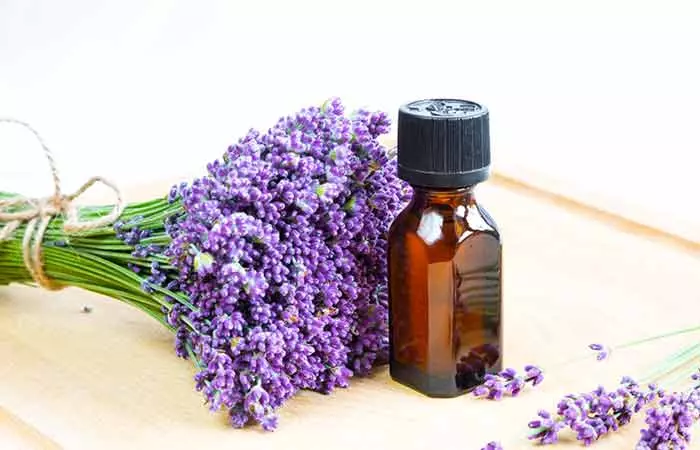
You Will Need
- 5-6 drops lavender oil
- A bowl of hot water
What You Have To Do
Add lavender oil to the hot water and inhale the steam for 5-10 minutes.
How Often You Should Do This
Do this once every day.
Why This Works
Lavender oil has been shown to inhibit the inflammation of the airways and control mucus production. It soothes the air passages and strengthens the immune system (13). Steam therapy is an effective method to attain most of the aromatherapy oil benefits.
(c) Tea Tree Oil For Asthma

You Will Need
- A few drops of tea tree oil
- Face cloth
- Warm water
What You Have To Do
1. Dip the face cloth in the warm water completely and then wring out the excess.
2. Pour the essential oil randomly on this damp cloth and inhale the vapors until the cloth comes back to room temperature.
How Often You Should Do This
Repeat this a few times until the asthma symptoms have vanished and you feel better.
Why This Works
The expectorant and decongestant properties of tea tree oil will work in relieving the wheezing and coughing and eliminating the excess mucus. This essential oil also possesses anti-inflammatory and antimicrobial properties, which will help reduce the inflammation in the airways and treat any infections that are present in the respiratory system (14).
(d) Kalonji Oil For Asthma
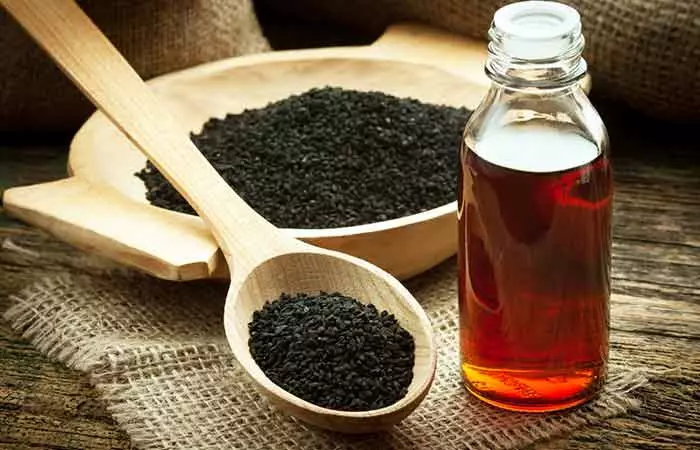
You Will Need
- 1/2 teaspoon kalonji oil
- 1 teaspoon honey
- A cup of warm water
What You Have To Do
Add the kalonji oil and honey to the water, and drink this once before breakfast and once again after dinner.
How Often You Should Do This
Repeat this for 40 days for best results.
Why This Works
Kalonji oil is also called Black Seed Oil. The list of its benefits is endless. Its anti-inflammatory properties prove beneficial in the treatment of asthma. It is also used for the treatment of bronchitis (15).
(e) Oregano Oil For Asthma

You Will Need
- A few drops of oregano oil
- Essential oil diffuser
What You Have To Do
Put the essential oil in the diffuser and inhale the vapors. Let the diffuser use up all the oil.
How Often You Should Do This
You can use this remedy every day to keep asthma symptoms at bay.
Why This Works
Oregano oil cleanses the lungs and the air passages. It has antibacterial, antifungal, and anti-inflammatory properties that may ease lung issues (16). It is said to thin the mucus and eliminate infection-causing bacteria and viruses.
2. Honey For Asthma
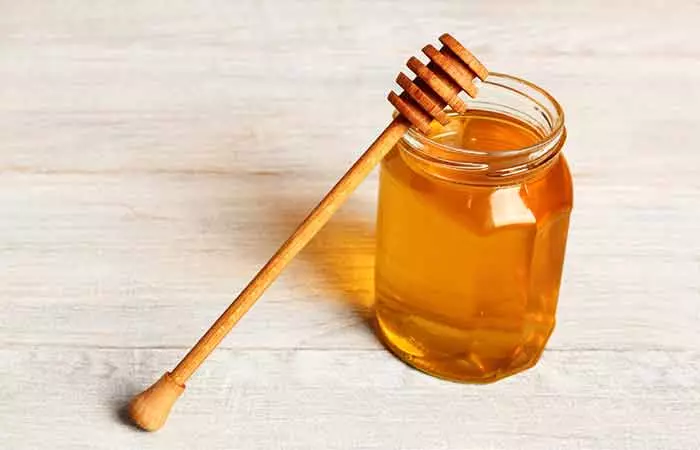
You Will Need
- 2 teaspoons honey
- A glass of warm water
- 1/2 teaspoon cinnamon powder
What You Have To Do
1. Mix one teaspoon of honey in the water and drink this slowly.
2. Swallow another teaspoon of honey with the cinnamon powder before going to bed.
How Often You Should Do This
Drink this honey water three times in a day. Have the honey and cinnamon mix every night before going to bed.
Why This Works
Honey is one of the oldest and most natural remedies for breathing problems. It contains alcohol and other oils that help alleviate the symptoms of asthma. It will help remove phlegm from your throat and allow you to sleep better (17).
3. Turmeric For Asthma
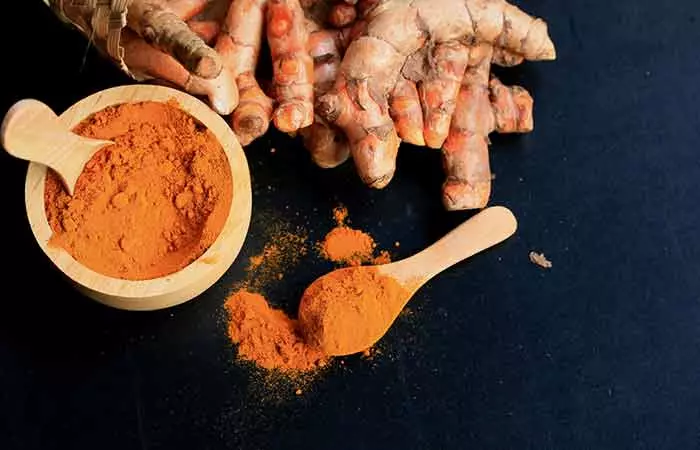
You Will Need
- 1/4 teaspoon turmeric powder
- A glass of water
What You Have To Do
Ingest the turmeric along with water.
How Often You Should Do This
Repeat this thrice a day for 10-14 days. If there is no improvement in the symptoms, double the dosage.
Why This Works
Turmeric contains curcumin as one of its main components. This phytochemical is very beneficial as an add-on therapy to relieve asthma. It modulates the inflammatory response of the body and alleviates the inflammation of the airways. Turmeric is also an excellent antimicrobial agent (18).
4. Coffee For Asthma

You Will Need
A cup of hot coffee
What You Have To Do
Brew a hot, steaming cup of your favorite coffee and drink it.
How Often You Should Do This
Drink hot coffee as an immediate remedy to get relief from asthma.
Why This Works
Drinking coffee is the easiest way to treat asthma as it immediately eases up the airways and helps you breathe. Many swear by the positive effects of drinking coffee and recommend it as the quickest antidote for asthma. Caffeine in the coffee acts as a bronchodilatori A type of drug that widens the bronchi and opens airways in the lungs to minimize asthmatic symptoms. and opens up the constricted airways (19).
5. Vitamins For Asthma

You Will Need
- Vitamin D supplements
- Vitamin C supplements
What You Have To Do
Take a tablet of each of these vitamin supplements every day.
How Often You Should Do This
Continue taking these supplements for a month. If there is still no difference, please consult your doctor.
Why This Works
Vitamin D supplementation has shown effective results in alleviating asthma symptoms. This is because of its anti-inflammatory action and its ability to enhance the body’s innate antimicrobial response (20). Even though sufficient data could not be collected to know if vitamin C helps in treating bronchial asthma, it did help in alleviating exercise-induced asthma symptoms. It was shown to improve the functioning of the lungs (21).
6. Ginger For Asthma
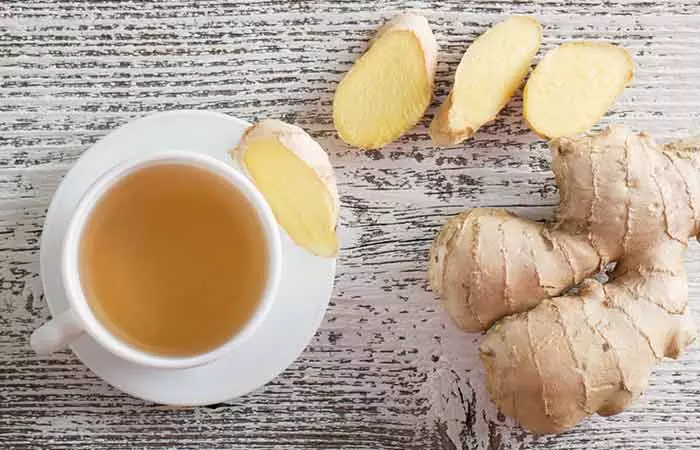
You Will Need
- 1 teaspoon grated ginger
- A cup of hot water
- 1/2 teaspoon honey
What You Have To Do
- Grate fresh ginger and add it to the hot water. Let it steep for five to seven minutes.
- Strain the water, add honey, and drink this herbal tea while it is warm.
You can also chew on a small piece of ginger a few times during the day.
How Often You Should Do This
Drink two to three cups of ginger tea in a day.
Why This Works
A herb famed for its anti-inflammatory properties for decades, ginger consumption is the best way to keep your respiratory tract healthy. This is the most common home remedy for asthma. Ginger relaxes the airway muscles and regulates calcium uptake, which in turn relieve the constriction and give relief from asthma (22).
 Quick Tip
Quick Tip7. Garlic For Asthma

You Will Need
- 10-12 garlic cloves
- 1/2 cup milk
What You Have To Do
Boil the cloves of garlic in the milk and drink this concoction.
How Often You Should Do This
Drink this once a day.
Why This Works
Garlic helps clear the congestion in your lungs and is a sure shot remedy that provides quick relief from asthma symptoms. It also reduces the inflammation of the airways (23).
8. Onions For Asthma

You Will Need
Raw onion
What You Have To Do
Chomp a few slices of raw onion with your supper to reap the benefits of this veggie.
How Often You Should Do This
Include onions in your daily diet.
Why This Works
Yes, onions are pungent, and can be a big turn-off to many. However, those suffering from asthma can benefit from onions. This vegetable that makes many cry can be a boon to asthmatics. It has anti-inflammatory properties and helps clear the airways (24).
9. Khella For Asthma

You Will Need
- 30 to 60 drops khella tincture
- A cup of water
What You Have To Do
Add the khella tincture to the water and drink it.
How Often You Should Do This
Take this thrice a day and once before going to bed. Continue taking this for a couple of weeks to notice the benefits.
Why This Works
Otherwise known as Bishop’s weed, this herb has often been used to treat asthma, bronchitis, and heart disease in Ayurvedic and Egyptian medicine. It has antihistaminei A class of medication used to treat allergic conditions such as common cold, rhinitis, influenza, and other allergic reactions. properties and prevents asthma (25). Its antispasmodici A type of drug or substance that can help manage involuntary muscle spasms or cramps that occurs in the gut. properties dilate the constricted bronchioles.
Caution
Khella is a preventive remedy for asthma. Khella is not for use in asthma attacks.
Other essential oils like peppermint oil and tea made of licorice root and chamomile can also calm coughs and bronchitis. Before using any of these remedies, make sure that you are not even slightly allergic to any of them. And if you are, using them will only prove to be counter-productive in treating the asthma symptoms. If you are still doubtful, consult your doctor before using the remedy.
What Exercises Control Asthma?
Just because you have asthma, it does not mean that you cannot lead an active life. Exercising daily, doing yoga, or going for walks and swims will help you keep asthma attacks at bay. Cardio workouts like walking, cycling, or light running will keep your body fluids flowing and prevent excess mucus build-up in the airways.
- Breathing Exercises
Try doing these breathing exercises to keep your asthma under control:
- Simple breathing – This is also known as diaphragmatic breathing. Lie down or sit with your back straight. Breathe in and out slowly. Your stomach should expand during inhalation, and not your chest. While exhaling, your stomach should contract.
- Buteyko breathing – Sit in an upright position with the chest and belly muscles relaxed. Take a long shallow breath and exhale slowly. Hold your breath for as long as possible. Then, continue breathing gently.
- Pursed lip breathing – While in the simple breathing position, exhale through pursed lips like you are blowing a whistle. Exhaling should ideally be twice as long as inhaling.
These exercises can also be called chest exercises as they involve your chest muscles. Remember to not overexert yourself and your lungs while doing any type of exercise.
Andrew Folts, an illustrator, writer, and Youtuber, talks about his experience dealing with asthma from when he was in school. He eats healthy food and avoids dairy caffeine and gluten food to help manage the condition’s symptoms. He says, “For exercise-induced asthma, whenever my chest started to feel tight, I would push back by breathing slower and more deeply (i). ”
- Yoga
Research shows that yoga does, in fact, improve the symptoms of asthma (26). Yoga therapy may significantly improve the severity and duration of asthma attacks. Hath yoga uses breath and meditation to connect the mind with various parts of the body, making them one united functional unit. This may aid in asthma control.
A study involving people with chronic severe airway obstruction found that yoga training could significantly improve the symptoms and reduce asthma attacks (26). Many studies in India have shown the many benefits of yoga in bronchial asthma management. Another study involving yoga practice showed substantial improvement in asthmatic symptoms within a short duration of 13 days (27).
A study conducted in Ethiopia showed how yoga improved asthmatic symptoms (26). Twenty-four people dealing with asthma took part in the study. For 4 weeks they practiced yoga for 50 minutes everyday. They had decreased asthmatic attacks and used their medications and the puffer less. Their training consisted of:
- A warm up with relaxed breathing techniques and stretching exercises for 5 minutes.
- A loosening exercise, for 5 minutes, to relax different joints.
- Ten minutes of general yoga postures in standing and sitting positions, along with slow breathing techniques.
- Ten minutes of deep relaxation practice involving slow breathing to calm the mind and relax muscles.
- A slow breathing technique practice that consisted of slow deep breathing without holding your breath, for 10 minutes.
- The sessions ended with a 10-minute discussion on emotional well-being, keeping a general positive outlook, and feeling relaxed and free.
You can also try yoga mudras to manage asthma. There are also some yoga asanas you can practice.
- Stress Relief
Stress and asthma are known to be linked (28). Not only is stress a symptom of asthma, but it may also cause the issue. People with asthma may struggle with stress, anxiety, depression, and negative emotions. A study conducted in Korea showed that adolescents with asthma had higher stress levels (29).
It’s important to look for stress-relieving outlets to manage asthma.
- Consider speaking to a therapist.
- Avoid a stress-filled lifestyle.
- Practice breathing and stretching exercises.
- Talk to a stress management consultant to help balance your schedule, workload, and lifestyle.
- Find a relaxing outlet like dancing, rock climbing, walking, a laughing club, etc.
Another extremely helpful way to relieve stress and manage asthma attacks is to exercise.
- Physical Activity
A common misconception is that people with asthma should not exercise as it leads to asthmatic-like symptoms. However, research shows that physical activity can improve cardiorespiratory fitness and manage stress (29). In fact, enhanced physical activity improves asthma control (30).
But it is very important to know which exercises to practice. To maintain cardiorespiratory fitness, the World Health Organization recommends 150 minutes (two and a half hours) of moderate-intensity aerobic exercises or 75 minutes of vigorous-intensity exercises throughout the week.
However, don’t overexert yourself or try extreme workouts. There are safe exercises you can try, like resistance and strength training. To make sure you have an idea of which exercises you should perform and the intensity of workouts, speak to a physical trainer (therapist).
- Acupuncture
Acupuncture is a holistic treatment method that has been a part of traditional Chinese medicine for a long time. It is said to enhance the immune system and relieve congestion caused by phlegm. Acupuncture can inhibit allergic reactions and exhibit anti-asthmatic activity to relieve symptoms (31).
Acupuncture works on the theory that there are pressure points that connect the organ meridians in your body. Energy passes through each of these meridians connecting various organs to each other. Acupuncture uses needles to activate these pressure points. For asthma, there are two acupoints to be aware of: the lung meridian and the heart meridian (32). The lung meridian is directly connected to the lungs, while the heart meridian is indirectly connected to the lungs. These two acupoints are the focus of asthma therapy in acupuncture.
- Speleotherapy
Speleotherapy is a type of therapy where people confine themselves to subterranean or underground places, like mines or caves. They stay there for a short period of time, like an hour, and practice physical and breathing exercises.
It originated as salt therapy in the salt mines of Poland, dating back to the 12th century. The name speleotherapy or halotherapy became popular in the 1960s. The miners who were breathing salty air were free from any respiratory conditions due to the high concentration of salt in the mines.
The curative properties of this therapy lies in the air quality, underground climate, and radiation levels of these caves and mines (33). Because of the moderate to high levels of humidity, the air in these underground places is pure. There is little to no pollution, dust, gas pollutants, and pollen to cause breathing issues. There are low levels of bacteria. The climate is constant and the air contains minerals like sodium, magnesium, calcium, potassium, and more.
However, more research is needed to solidify the role of speleotherapy in asthma management.
- Hypnotherapy
In hypnotherapy, people are lulled into a trance-ish state where they are more relaxed, focused, and open. In a hypnotherapy study conducted with 20 patients, 11 patients showed an excellent response in asthma management, while 5 showed a good response to the therapy (34). Similarly, another study suggested that hypnotherapy might be more effective than breathing exercises in men and women (35).
Research also suggests that hypnotherapy might aid in asthma management in adolescents (36). But not much is known about how exactly hypnotherapy works in the body to reduce asthma attacks. It is said to inhibit inflammation and allergic responses in the airways by relaxing it (37).
However, while hypnotherapy may be a budding remedy for asthma, there still need to be research conducted to learn its neurophysiological and biomedical affects in the body (37).
Now, let us take a look at some preventive measures you need to take to prevent asthma attacks, because, needless to say, prevention is better than cure. Keep reading.
Goal List For How To Manage Asthma
- To better manage your symptoms, you need to track them. Track your symptoms and triggers. This can also help you understand if a treatment is working for you or not.
- Take your medications as prescribed, even if you notice an improvement. Only discontinue the course of treatment after consulting your doctor.
- There are different types of asthma breathers, puffers or inhalers. Check with your doctor which one better suits your needs.
- The use of air purifiers is recommended to reduce the concentration of dust mites and allergens at home (38). Similarly, using humidifiers may combat dry air that affects the airways and respiratory system.
- Have an action plan that is decided by your doctor. This plan not only sets your daily treatment in focus, but it also has red flags to look for so you know if your symptoms are worsening and what you can do about them.
- Practice any of the above mentioned remedies: yoga, natural treatments, stress relief, exercising, speleotherapy, acupuncture, and hypnotherapy. But first consult your doctor as they can recommend the best option.
- Get vaccinated against respiratory infections like flu and pneumonia, as they may trigger asthma attacks.
- If you notice any symptoms of an asthma attack, use an asthma inhaler to open your airways.
 Quick Tip
Quick TipAnother key factor in managing asthma is your diet. There are certain foods you can eat and some you should avoid.
Diet To Follow For Asthma
The importance of a healthy diet cannot be contested. Incorporate fresh and organic fruits and vegetables in your daily diet and see the difference. Food rich in antioxidants, vitamins, and minerals will ensure healthy functioning of the respiratory system. Some foods that are good for asthmatics are given below:
- Fruits – apples, cantaloupes, bananas, kiwi, pineapple, and berries
- Vegetables – carrots, garlic, avocado, broccoli sprouts, spinach, sweet potatoes, ginger, tomatoes, kale, and Swiss chard
- Juices – make a healthy concoction by using any of the fruits and vegetables listed above.
- Including probiotics like yogurt and cheese can aid in asthma relief due to their anti-inflammatory properties(39).
Steer clear of junk food and fried fatty food that can act as a trigger for an asthma attack. Consuming foods rich in omega-3 fatty acids has been associated with reduced asthma symptoms (40).
List Of Foods That Trigger Asthma
Foods that are allergens around the world are found to be responsible for triggering an asthma attack. The common ones are listed below:
- Soy and its products
- Milk and milk products
- Peanuts and other nuts
- Fish, shrimp, and other shellfish
- Wheat
- Gluten
- Eggs
Food additives such as MSG (Monosodium glutamate) can also trigger asthma.
Infographic: When To See A Doctor If You Have Asthma
Asthma is a medical condition that develops when your airway is inflamed and produces extra mucus. While medication, home remedies, and lifestyle changes may help you manage it, they may sometimes fail. Check out the infographic to understand when you should see a doctor if you have asthma. Illustration: StyleCraze Design Team
To recap, asthma causes the airways in the lungs to become inflamed, leading to breathing issues. There are five types of asthma, and their causes vary from respiratory infections and medicines to allergens and food chemicals. There are natural home remedies for asthma that you can try, like essential oils, honey, ginger, and more. Additional therapies include stress relief, physical activity, and yoga. There are new treatments you can learn more about like speleotherapy, hypnotherapy, and acupuncture. You should also watch your diet and avoid ingredients that can trigger asthmatic attacks. However, ensure you first consult a doctor before trying any of these remedies and treatments to avoid any adverse effects or injuries.
Frequently Asked Questions
Are There Things I Can Change In My Life To Reduce My Risk Of An Asthma Attack?
A healthy lifestyle, which includes a decent diet and optimum levels of exercise, can definitely help reduce the risk of an asthma attack. Using home remedies made with garlic or khella is an effective prevention measure against asthma.
Does Stress Trigger Asthma?
Stress does not specifically trigger asthma, but it can make dealing with its symptoms worse and unbearable.
Can You Grow Into Asthma?
Asthma can affect anybody at any age. Usually, children develop asthma due to allergies, and adults grow into it due to lung infections or exposure to an irritant, especially at the workplace.
What Does Asthma Feel Like?
During an attack, an asthmatic experiences regular cough and wheezing, which leads to shortness of breath and tightness of chest.
Can You Get Lung Cancer From Asthma?
No! Asthma cannot develop into lung cancer. It can, however, lead to a severe respiratory condition known as chronic obstructive pulmonary disease (COPD).
At What Age Do You Get Asthma?
People can develop asthma at any age, be it 5 or 50.
Is It True That Asthma Can Be Cured By Fish Therapy?
The fish therapy is administered in the city of Hyderabad, India, for asthma sufferers. The family that holds the secret of the herbs that are used and also many patients claim that this therapy, when taken for three consecutive years, can cure asthma. No research has been conducted on this therapy, and its effectiveness hasn’t been verified by experts. This therapy has become famous only by word-of-mouth and from patients who have benefitted from it.
Is Vicks good for asthma?
No, Vicks does not help relieve asthma but helps reduce symptoms of the flu and the common cold. Consult your doctor for proper treatment of asthma.
How long do asthma attacks last?
Mild asthma attacks can last for a few minutes. However, in severe cases, it may last between a few hours to days.
What makes asthma worse at night?
Factors like dust mites on pillows, mattresses, and blankets and pollen can lead to breathing difficulty at night (nocturnal asthma) (6).
Illustration: Effective Home Remedies For Asthma Attack
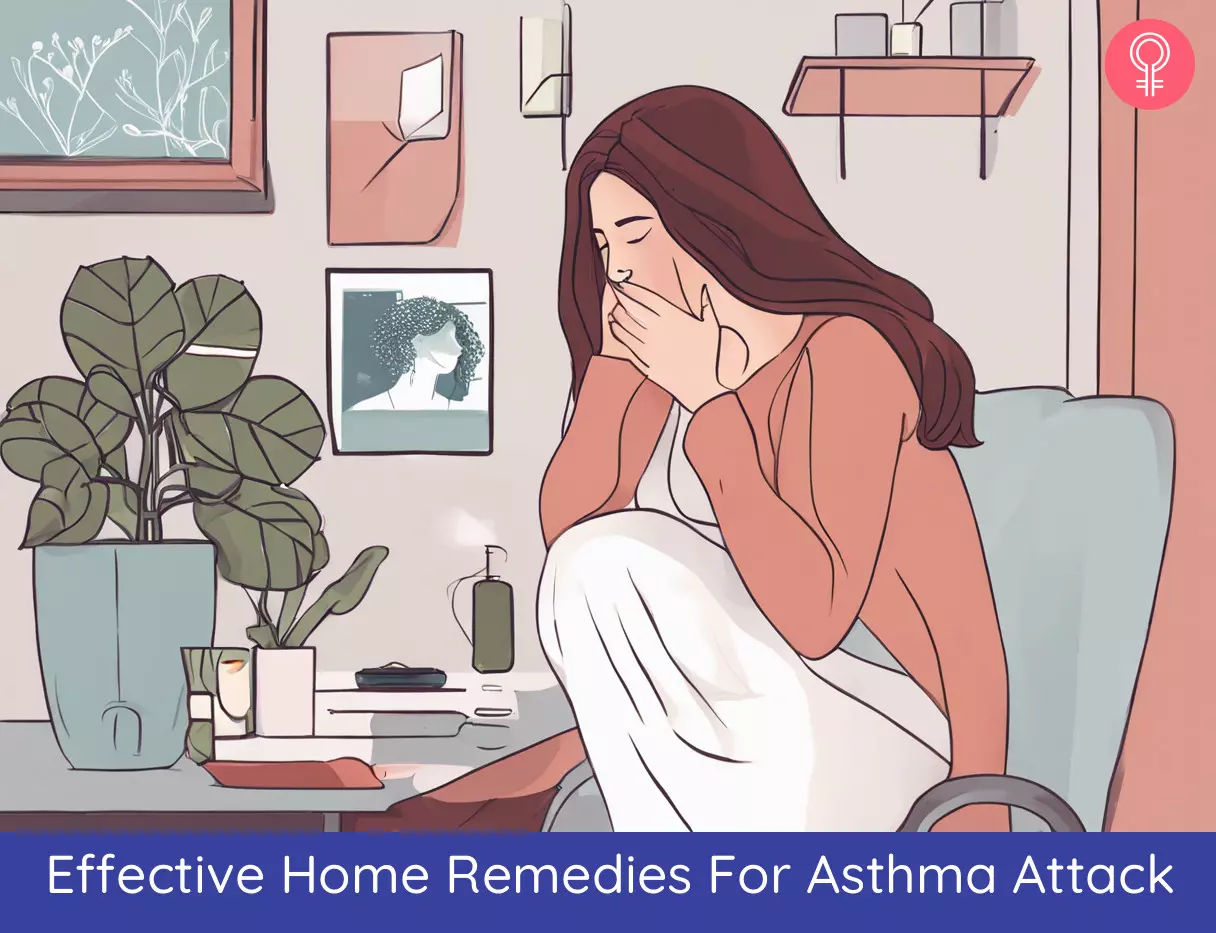
Image: Stable Diffusion/StyleCraze Design Team
Learn to treat asthma with simple home remedies naturally. Click on this video to know about easy and effective ways to reduce asthma symptoms and improve your breathing.
Personal Experience: Source
StyleCraze's articles are interwoven with authentic personal narratives that provide depth and resonance to our content. Below are the sources of the personal accounts referenced in this article.
i. ASTHMA / how to cure exercise induced wheezing naturallyhttps://www.youtube.com/watch?v=jv-revgQdPE
References
Articles on StyleCraze are backed by verified information from peer-reviewed and academic research papers, reputed organizations, research institutions, and medical associations to ensure accuracy and relevance. Read our editorial policy to learn more.
- What Is Asthma?
https://www.nhlbi.nih.gov/health/asthma - Allergic Asthma And Rhinitis Comorbidity
https://www.researchgate.net/publication/282434496_Allergic_asthma_and_rhinitis_comorbidity - Exercise-Induced Asthma: Current Aspects And Recommendations
https://www.scielo.br/j/rbme/a/fTPdZYxhVsbRZfrvd3yQy4w/?lang=en&format=pdf - Cough And Asthma
https://www.ncbi.nlm.nih.gov/pmc/articles/PMC3182093/ - Occupational/Work-Related Asthma
https://www.dir.ca.gov/dwc/DWCPropRegs/2025/MTUS-Evidence-Based-Updates-June-2025/ACOEM-Occupational-Asthma.pdf - Nocturnal Asthma
https://apjai-journal.org/wp-content/uploads/2025/07/6_AP-231020-0986-1.pdf - Genetics of asthma: an introduction for the clinician
https://www.ncbi.nlm.nih.gov/pmc/articles/PMC4629762/ - The link between atopic dermatitis and asthma- immunological imbalance and beyond
https://www.ncbi.nlm.nih.gov/pmc/articles/PMC8672460/ - Short-term exposure to pollen and the risk of allergic and asthmatic manifestations: a systematic review and meta-analysis
https://www.ncbi.nlm.nih.gov/pmc/articles/PMC7045159/ - Impact of air pollution on asthma outcomes
https://www.ncbi.nlm.nih.gov/pmc/articles/PMC7503605/ - Obesity and Asthma
https://www.ncbi.nlm.nih.gov/pmc/articles/PMC5973542/ - Beneficial Effects Of Eucalyptol In The Pathophysiological Changes Of The Respiratory System: A Proposal For Alternative Pharmacological Therapy For Individuals With COPD
https://www.researchgate.net/publication/327673108_Beneficial_Effects_of_Eucalyptol_in_the_Pathophysiological_Changes_of_the_Respiratory_System_A_Proposal_for_Alternative_Pharmacological_Therapy_for_Individuals_with_COPD - Lavender Essential Oil Inhalation Suppresses Allergic Airway Inflammation And Mucous Cell Hyperplasia In A Murine Model Of Asthma
https://pubmed.ncbi.nlm.nih.gov/24909715/ - Essential Oils In The Treatment Of Respiratory Tract Diseases Highlighting Their Role In Bacterial Infections And Their Anti‐inflammatory Action: A Review
https://www.ncbi.nlm.nih.gov/pmc/articles/PMC7163989/#ffj3252-note-0050 - A Review On Therapeutic Potential Of Nigella Sativa: A Miracle Herb
https://www.ncbi.nlm.nih.gov/pmc/articles/PMC3642442/ - Bio-Efficacy Of The Essential Oil Of Oregano (Origanum Vulgare Lamiaceae. Ssp. Hirtum)
https://www.researchgate.net/publication/266317014_Bio-efficacy_of_the_Essential_Oil_of_Oregano_Origanum_vulgare_Lamiaceae_Ssp_Hirtum - Medicinal And Cosmetic Uses Of Bee’s Honey – A Review
https://www.ncbi.nlm.nih.gov/pmc/articles/PMC3611628/ - Evaluation Of Efficacy Of Curcumin As An Add-On Therapy In Patients Of Bronchial Asthma
https://www.ncbi.nlm.nih.gov/pmc/articles/PMC4190737/ - Caffeine For Asthma
https://www.ncbi.nlm.nih.gov/pmc/articles/PMC7053252/ - Vitamin D And Asthma In Children
https://pubmed.ncbi.nlm.nih.gov/23069123/ - Vitamin C For Asthma And Exercise-Induced Bronchoconstriction
https://pubmed.ncbi.nlm.nih.gov/24154977/ - Effects Of Ginger And Its Constituents On Airway Smooth Muscle Relaxation And Calcium Regulation
https://www.ncbi.nlm.nih.gov/pmc/articles/PMC3604064/ - Purified Aged Garlic Extract Modulates Allergic Airway Inflammation In Balb/C Mice
https://pubmed.ncbi.nlm.nih.gov/18780948/ - Anti-Asthmatic Effects Of Onions. Alk(En)Ylsulfinothioic Acid Alk(En)Yl-Esters Inhibit Histamine Release Leukotriene And Thromboxane Biosynthesis In Vitro And Counteract Paf And Allergen-Induced Bronchial Obstruction In Vivo
https://pubmed.ncbi.nlm.nih.gov/2462422/ - Medicinal Plant Affected Respiratory Gastrointestinal Vascular And Uterine Smooth Muscle Contractility
https://www.researchgate.net/publication/360109204_Medicinal_plant_affected_respiratory_gastrointestinal_vascular_and_uterine_smooth_muscle_contractility - Clinical Effects Of Yoga On Asthmatic Patients: A Preliminary Clinical Trial
https://www.ncbi.nlm.nih.gov/pmc/articles/PMC3275836/ - Study Of Pulmonary And Autonomic Functions Of Asthma Patients After Yoga Training
https://pubmed.ncbi.nlm.nih.gov/9055100/ - A Study On Stress And Anxiety In Relation To Asthma
https://www.researchgate.net/publication/352983235_A_Study_on_Stress_and_Anxiety_in_Relation_to_Asthma - The Association Between Vigorous Physical Activity And Stress In Adolescents With Asthma
https://www.researchgate.net/publication/350428429_The_Association_between_Vigorous_Physical_Activity_and_Stress_in_Adolescents_with_Asthma - Physical Activity: A Missing Link In Asthma Care
https://www.ncbi.nlm.nih.gov/pmc/articles/PMC7141291/ - Acupuncture On Treating Asthma
https://journals.lww.com/md-journal/fulltext/2025/01030/acupuncture_on_treating_asthma__a_protocol_for.12.aspx - Acupuncture For Chronic Persistent Asthma Based On The Theory Of Meridian-Viscera Association: Study Protocol For A Multi-Center Randomized Controlled Trial In China
https://trialsjournal.biomedcentral.com/articles/10.1186/s13063-020-04844-8 - Speleotherapy For Asthma
https://www.ncbi.nlm.nih.gov/pmc/articles/PMC6435215/ - Hypnotherapy In The Management Of Asthma
https://www.tandfonline.com/doi/abs/10.1080/00029157.1968.10401994?journalCode=ujhy20 - Hypnosis For Asthma—A Controlled Trial
https://www.ncbi.nlm.nih.gov/pmc/articles/PMC1912142/ - Hypnosis As An Adjunct Therapy For Asthma: Case Report
https://www.sciencedirect.com/science/article/abs/pii/S0197007082800284 - Chronic Asthma And Improvement With Relaxation Induced By Hypnotherapy
https://journals.sagepub.com/doi/pdf/10.1177/014107688808101207 - Efficacy of air purifier therapy for patients with allergic asthma
https://pubmed.ncbi.nlm.nih.gov/34476917/ - Probiotics and Lung Diseases
https://www.sciencedirect.com/science/article/abs/pii/S0012369211601931 - Relationship between Serum Omega-3 Fatty Acid and Asthma Endpoints
https://www.ncbi.nlm.nih.gov/pmc/articles/PMC6338947/
Read full bio of Dr. Saba
Read full bio of Shaheen Naser
Read full bio of Arshiya Syeda
Read full bio of Aparna Mallampalli













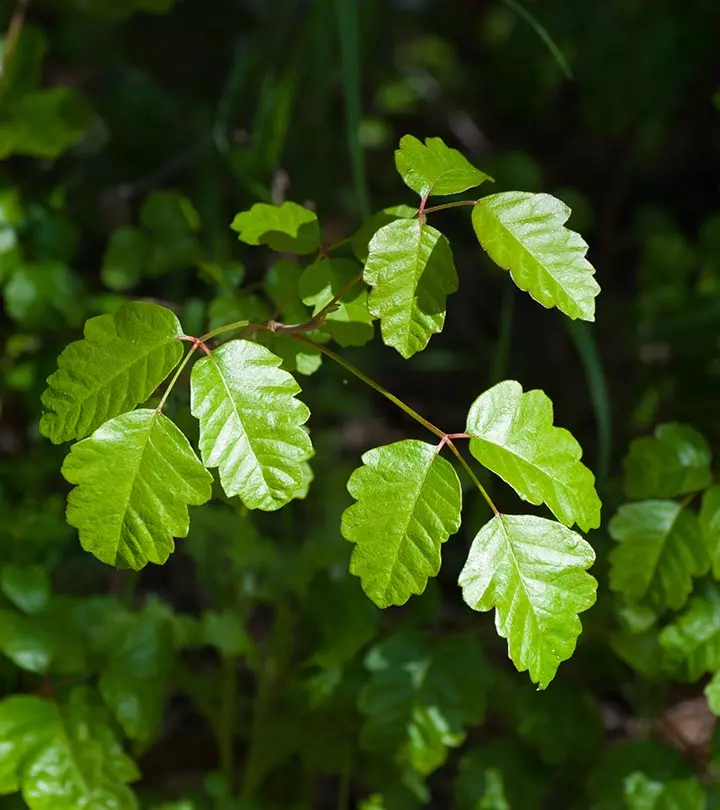





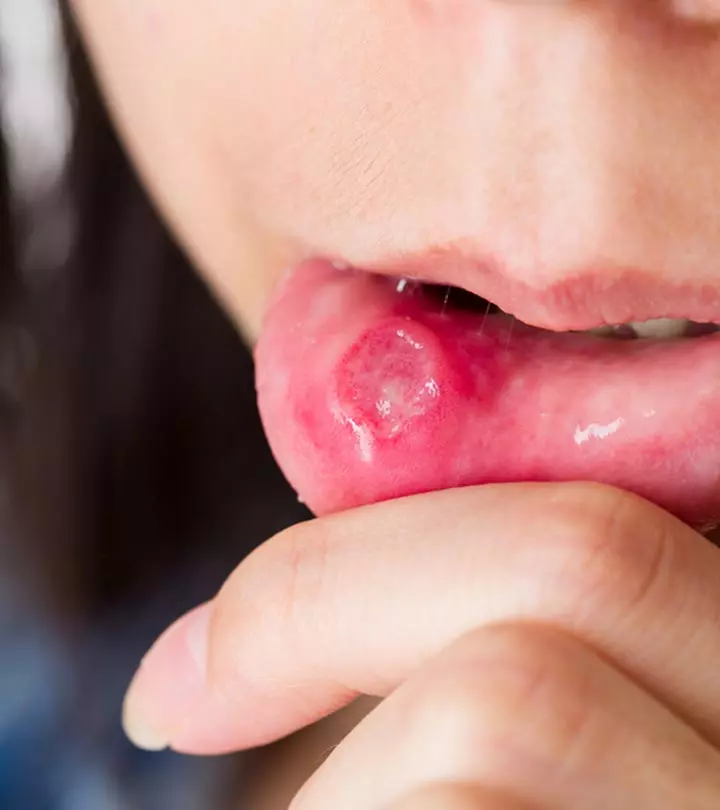





Community Experiences
Join the conversation and become a part of our empowering community! Share your stories, experiences, and insights to connect with other beauty, lifestyle, and health enthusiasts.